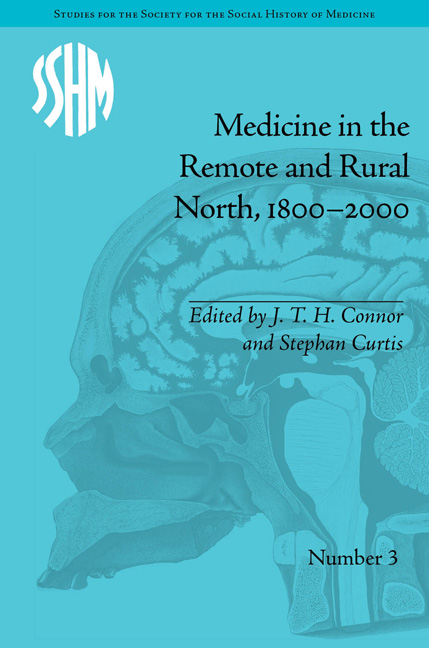Book contents
- Frontmatter
- CONTENTS
- Acknowledgements
- List of Contributors
- List of Figures and Tables
- Introduction: Cores/Peripheries – Rural/Remote: Medicine, Health-Care Delivery and the North
- Part I Remote Medicine and the State
- Part II Doctors and Doctoring in Remote Areas
- 5 A Country Doctor: Health Care in a Mid-Nineteenth-Century Swedish Remote Area
- 6 Medical Reports from the 1800s and What they Tell about Health Conditions, Population and the Work of Doctors in Peripheral Norway
- 7 ‘Medicine is Here to Stay’: Rural Medical Practice, the Northern Frontier and Modernization in 1930s' Newfoundland
- 8 Policing Practitioners on the Periphery: Elite Physicians and Profession-Building in a Bicultural Province, 1920–39
- Part III Women, Health Care and the Practice of Medicine
- Notes
- Index
8 - Policing Practitioners on the Periphery: Elite Physicians and Profession-Building in a Bicultural Province, 1920–39
from Part II - Doctors and Doctoring in Remote Areas
- Frontmatter
- CONTENTS
- Acknowledgements
- List of Contributors
- List of Figures and Tables
- Introduction: Cores/Peripheries – Rural/Remote: Medicine, Health-Care Delivery and the North
- Part I Remote Medicine and the State
- Part II Doctors and Doctoring in Remote Areas
- 5 A Country Doctor: Health Care in a Mid-Nineteenth-Century Swedish Remote Area
- 6 Medical Reports from the 1800s and What they Tell about Health Conditions, Population and the Work of Doctors in Peripheral Norway
- 7 ‘Medicine is Here to Stay’: Rural Medical Practice, the Northern Frontier and Modernization in 1930s' Newfoundland
- 8 Policing Practitioners on the Periphery: Elite Physicians and Profession-Building in a Bicultural Province, 1920–39
- Part III Women, Health Care and the Practice of Medicine
- Notes
- Index
Summary
Over the course of the interwar decades, the College of Physicians and Surgeons in the Canadian Province of New Brunswick began a programme of significant organizational reform. The Medical Council, a body that set and enforced licensing standards on behalf of the College, dramatically stepped up efforts to seek out unlicensed practitioners within their provincial borders and require them to supply proof of their credentials. This process turned out to be anything but straightforward. In the prosecution of its most intransigent cases, members of the Medical Council would find themselves drawn into a frustrating, drawn-out, merry-go-round of litigation. The medical registrar, J. M. Barry, complained in 1934 that when the Medical Council tried to enforce licensing legislation in the rural districts in the province, it found itself having to ‘fight with every interest in the County’ to do so. The rural frontiers of medical practice did not succumb to central authority easily, or willingly.
A case in point is their difficulty in policing one illegal physician, Dr Alfred Leger. Between 1927 and 1931, this American-trained doctor had moved around several northern towns and villages avoiding prosecution from the College. On two occasions, he had written to the Medical Council assuring them he had proper qualifications (although not presenting a diploma or other formal credentials). In these letters he had communicated both the desire and a commitment to practice in a rural area where the residents had little access to health care.
- Type
- Chapter
- Information
- Medicine in the Remote and Rural North, 1800–2000 , pp. 153 - 168Publisher: Pickering & ChattoFirst published in: 2014



